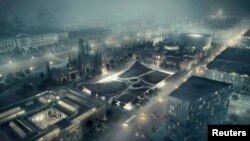The Smithsonian Institution, the world's biggest museum complex, unveiled a $2 billion plan on Thursday to revamp the south side of the National Mall, a favorite draw for Washington's millions of tourists.
The proposed master plan for the half-mile (800-meter) strip of museums, gardens and buildings along the U.S. capital's Independence Avenue will be carried out over 10 to 20 years starting in 2016, the institution said in a statement.
The plan by Danish architect Bjarke Ingels "provides the first-ever integrative vision for the South Mall," said Wayne Clough, secretary of the Smithsonian Institution.
At a news conference, Ingels said he sought to tread lightly in his redesign for part of the two-mile-long (3.2-km-long) National Mall, home to monuments and museums and known as "America's Front Yard."
"This is probably the most heavily regulated piece of real estate on planet Earth," he said.
The centerpiece of Ingels' plan is a makeover of the Smithsonian Castle. Built in 1855 and one of Washington's landmarks, the building serves as a visitor center and the institution's headquarters.
The proposal calls for restoration of the building's Great Hall and the addition of a two-level underground space. The Castle will also get an upgrade of its building systems and reinforcement against earthquakes.
The plan calls for new Mall entrances to the National Museumof African Art and the Arthur M. Sackler Gallery, which is dedicated to Asian art.
It also outlines improved visibility and access from the Freer Gallery of Art to the Hirshhorn Museum and Sculpture Garden, home to works by such artists as Henry Moore and Auguste Rodin.
The plan has to be reviewed by the National Capital Planning Commission. The $2 billion project would be paid for by private and federal funds, but Smithsonian officials were uncertain of the exact sources.
"We haven't gotten to the point of really drilling down and figuring out what that split would be," said Al Horvath, the Smithsonian's undersecretary for finance and administration.
The Smithsonian groups 19 museums and galleries, the National Zoological Park and nine research centers. It had 30 million visits last year.
